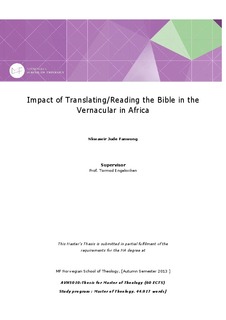Impact of translating / reading the Bible in the vernacular in Africa
Master thesis
Permanent lenke
http://hdl.handle.net/11250/197289Utgivelsesdato
2014-07-09Metadata
Vis full innførselSamlinger
Sammendrag
The phenomenon of translating the bible from the Hebrew, Greek, and Latin, into other
languages is not new. It has been examined many times before but mainly from different
perspectives such as the socio-cultural, linguistic and literary contexts, exegetical ( as the basis
for commentary), religious, missionary, historical, and even political. Previous endeavors have
tended to overlook or marginalize the impact of translating the bible into vernacular
languages. As a consequence, the underlying effects and dangers of translation have not been
directly and fully exposed, mainly due to the polarization of religious views in succeeding
centuries. In order to bring a different dimension to the subject therefore, in this thesis, I
intend to investigate the impact of translating the Bible into the vernacular languages. This
translation has a long history in Christendom. Formerly, it was solely the prerogative of the
clergy to possess the Bible. The laity was once forbidden by the Catholic church to possess,
read or even touch the bible considered as a holy book. This was to combat heresies , and to
preserve the unity of the Church. After sometimes she changed this position thus allowing the
laity to possess and read the bible. However, before this ban was lifted, some individual
clergies had translated the bible to some vernacular languages and this had a great impact on
the lives of the laity and on the society( e.g., Martin Luther’s translation of the bible to the
German language played a major role on the birth of the Reformation and on Protestant
theology). With this in mind, I shall endeavor to explore the following concerns: 1) Should the
Bible be translated into local vernacular languages? 2) In case it should, what are the impact,
the effects, implications and dangers of such an enterprise on the individual, the evangelizing
mission of the Church, on culture, and traditional religious beliefs in Africa?
